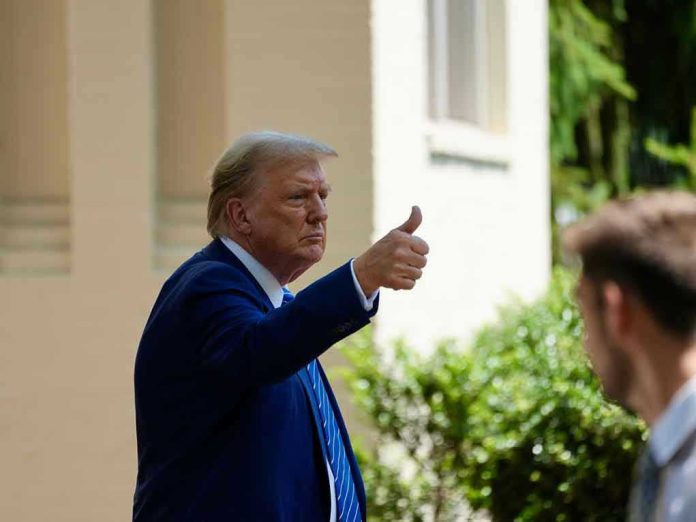
A single stroke of the presidential pen shattered months of legal consequence—Trump’s commutation of George Santos’s sentence thrusts questions about power, loyalty, and justice into a spotlight the nation cannot ignore.
Story Snapshot
- Donald Trump commuted George Santos’s prison sentence for fraud and identity theft, triggering immediate release.
- Santos’s conviction remains, but his sentence was cut short amid allegations of “horrible mistreatment.”
- The decision energized political allies and reignited debate about the limits and ethics of presidential clemency.
- Victims, lawmakers, and the public now grapple with the fallout of executive intervention in a high-profile criminal case.
Trump’s Intervention: The Power to Set a Man Free
Donald Trump’s announcement on October 18, 2025, jolted political circles and legal observers alike: former Congressman George Santos, convicted of stealing the identities of eleven people—including his own relatives—was to be released from FCI Fairton, New Jersey, effective immediately. The commutation did not erase Santos’s conviction; he remains a felon on the books, but the sentence was slashed with a few words from the president, delivered via social media. The timing and method of release—just before 11:00 p.m. Eastern—added drama to an already controversial case.
Trump’s statement cited “horrible mistreatment” as the motive for intervention, echoing familiar themes from prior clemency decisions during his presidency. By releasing Santos, Trump not only exercised one of the most unilateral powers available to a president but also reignited debate over the boundaries of executive authority. Santos, freshly freed, wasted no time expressing gratitude to Trump and Rep. Marjorie Taylor Greene, whose advocacy played a visible role in the campaign for his early release.
The Political Network Behind the Decision
George Santos’s fall from grace began with revelations of financial fraud and identity theft, ultimately landing him in federal prison. In the months leading up to his release, a coalition of political allies—most notably Marjorie Taylor Greene—rallied to his cause, arguing that his prosecution was politically motivated and excessive. Trump’s commutation reflects not just personal loyalty but a broader pattern: using executive clemency to reward allies and challenge perceived judicial overreach. This strategy has precedent in cases like Scooter Libby and Roger Stone, but Santos’s crimes—stealing identities from his own family—add a layer of complexity and controversy.
The mechanics of the commutation were handled by Joseph Murray, Santos’s attorney, and overseen by the U.S. Pardon Attorney, ensuring procedural compliance. Yet, the real power lay in Trump’s hands, as he bypassed traditional review processes and responded directly to appeals from his political network. This dynamic underscores the enduring influence of Trump’s brand of politics: loyalty and spectacle, often trumping legal norms and institutional caution.
Legal Ramifications and the Shadow of Conviction
A commutation, by legal definition, reduces the sentence but leaves the conviction intact. Santos, now free, faces lingering consequences: he owes $370,000 in court-ordered restitution and remains a convicted felon, with future legal and political prospects clouded by his criminal record. Legal experts warn that such interventions, while constitutional, risk undermining the deterrent effect of prosecution for public officials. Critics argue that the move politicizes the justice system, casting doubt on the impartiality and effectiveness of judicial outcomes.
Supporters counter that Santos was a victim of prosecutorial excess, and that Trump’s intervention corrects an injustice. The speed and visibility of the commutation amplify its impact: Santos’s social media accounts, managed by friends and family during his incarceration, quickly became platforms for public statements and political gratitude. The court of public opinion remains sharply divided, with each side interpreting the event through lenses of ideology and allegiance.
Implications for Justice, Politics, and Public Trust
The fallout from Santos’s release will reverberate beyond immediate headlines. Victims of his fraud—many of whom are family members—must reconcile with a justice system that delivered conviction but not full punishment. The public, witnessing yet another high-profile use of executive clemency, faces renewed questions about fairness and accountability. Lawmakers and political insiders will study the precedent, considering how it may shape future acts of presidential pardon or commutation.
The broader impact reaches into the fabric of American governance: every act of clemency by a president tests the boundaries between legal consequence and political expediency. Trump’s decision, confirmed by direct reporting and official statements, highlights the tension between executive power and judicial process—a tension that will shape debates about the rule of law and the meaning of justice in the years to come.
Sources:
‘Have a great life!’ Trump orders prison release of disgraced ex-lawmaker Santos




